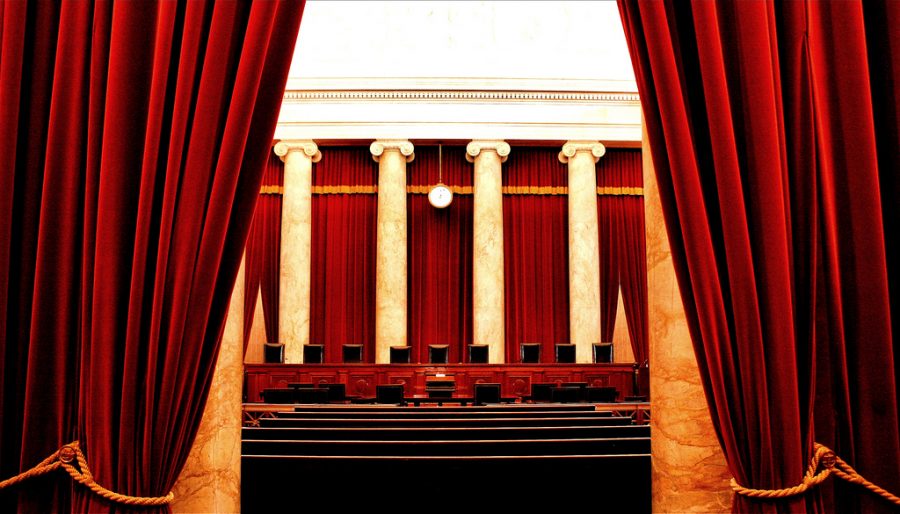NYU Takes Legal Action Against Trump Travel Ban
Inside the Supreme Court of the United States.
April 9, 2018
On March 30, NYU lawyers filed an amicus curiae brief against the latest iteration of President Donald Trump’s travel ban. The brief, addressed to the United States Supreme Court, was filed in support of the case’s respondents, representing the State of Hawaii.
A federal judge from Hawaii, Judge Derrick Watson, blocked the most recent revision of the ban in October 2017, one day before it was set to take effect. In January, the Supreme Court considered hearing Watson’s challenge to the ban.
NYU General Counsel Terrance Nolan wrote the brief with the Manhattan-based law firm Proskauer Rose LLP, which assisted on a pro bono basis, according to NYU Associate Vice Chancellor for Global Programs Josh Taylor. The brief is the fourth NYU has filed against various iterations of the travel ban, the previous three being filed in March and April 2017.
The brief filed on March 30 closely resembles the previous briefs. Lawyers argue that, in representing one of the most globally diverse universities in the world — with a primary campus situated in one of the most diverse cities in the world — the university maintains a significant stake in the case’s outcome.
“NYU has a vital interest in the proper administration, within constitutional limits, of the immigration laws of the United States,” the brief states. “NYU is deeply concerned that Proclamation 9645 … like its predecessor Executive Orders, exceeds those limits. If allowed to stand, it would impair unique educational opportunities that NYU is otherwise able to provide, inflicting harm on the University, on its constituents and on the community at large.”
The brief makes three primary arguments against the travel ban: that international diversity is critical to NYU’s identity and mission, that the ban significantly harms NYU’s present and prospective community members and that the ban violates the First Amendment’s Establishment Clause and the Immigration and Nationality Act of 1965.
“By indiscriminately targeting individuals from the Muslim-majority countries of Iran, Libya, Somalia, Chad, Syria and Yemen without any basis to believe that such individuals pose the slightest threat to the national security of the United States, the proclamation improperly compromises the diversity that is central to NYU’s identity and mission,” the brief states.
The brief claims that prior statements made by the president provide evidence of Islamophobia, implying bigoted objectives in enacting a ban against Muslim-majority nations. This section of the brief cites eight tweets made by Trump and other statements the president has made in various settings.
“The Proclamation thus links itself to the countless statements of the president that, without any evidence whatsoever, perpetuate the stereotype that people of Muslim faith are largely terrorists seeking to harm the United States,” the brief states.
The amicus brief continues NYU administration’s outspoken opposition to Trump. Since the start of the 2017-2018 academic year, President Hamilton has released memorandums criticizing the travel ban, the White House’s rescinding the Deferred Action for Childhood Arrivals program, Trump’s response to the “Unite the Right” Charlottesville rally in August and the Congressional tax bill signed by Trump in December.
NYU trustees have been criticized by student activists for their ties to Trump. Trustee John Paulson donated to Trump’s campaign and serves as an economic adviser to the president, and trustee Ken Langone, who made headlines in November for anti-immigrant rhetoric, donated to Trump’s campaign.
A previous memorandum released by Hamilton in March 2017 explained NYU’s reasoning behind filing the first rounds of amicus briefs against the travel ban. Taylor told WSN that the memorandum applies equally today as it did over a year ago.
“It saddens and frustrates me to think of students and scholars who so wish to be at NYU, who worked so hard to be admitted or appointed, who might contribute so much to our community, thwarted from doing so because of an ill-advised policy,” Hamilton wrote in the memorandum.
A version of this article appeared in the Monday, April 9 print edition. Email Alex Domb at [email protected].


























































































































































Johnny Asega • Apr 13, 2018 at 6:37 pm
The people voted for Trump, and his policies. Even if you say that the majority of people did not vote for him. The Fact is, almost half of the country said yes to the travel ban, wall and deportations
mara kelly • Apr 11, 2018 at 5:47 pm
so funny. so careful when it comes to study in israel, but freak out when some of these terror states are affected. that’s nyu for you.
A. Student • Apr 11, 2018 at 12:49 pm
This is ridiculous, NYU is using our tuition money to fund a political cause!
John D. Horton • Apr 9, 2018 at 2:48 pm
Congress gave the executive branch broad authority to save guard the American people in relation to immigration. Those opposed to Trumps exercise of his authority would have to demonstrate an “abuse of discretion” which is almost impossible to accomplish.